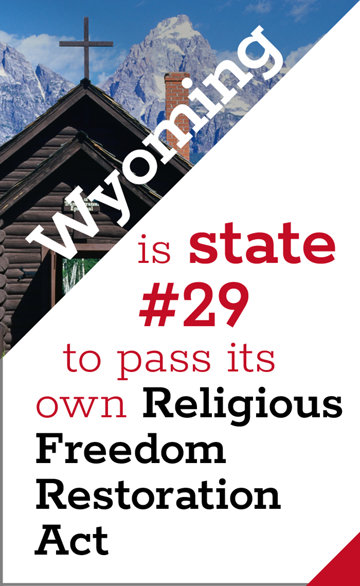Signed into law by Governor Mark Gordon on March 6, the Wyoming Religious Freedom Restoration Act will take effect on July 1. The measure closely mirrors the federal Religious Freedom Restoration Act (RFRA) of 1993, but goes further by establishing a legal framework for challenging state and local government actions that “substantially burden” religious exercise.
The legislation “ensures every Wyomingite receives a fair hearing when the question arises as to whether the government is seeking to force that person to violate his or her religious beliefs,” a spokesperson for the governor’s office told Catholic News Agency.
Wyoming’s new law adds momentum to a broader national trend of reasserting religious liberty at the state level.
The new law applies to all state and local laws, rules, ordinances and policies, even those already on the books. It also includes rules that apply broadly to the general public, ensuring protections are available even when universal regulations—like zoning laws or school mandates—conflict with individual religious practices.

A “burden,” as defined by the law, can be anything that “constrains, inhibits, curtails or denies the exercise of religion.” That includes denying access to government programs, withholding benefits or excluding people from public services or spaces.
Under the new Wyoming RFRA, the government may only impose such a burden if it can prove that burden serves a compelling government interest and is the least restrictive means of achieving that goal—a high legal standard called “strict scrutiny” that tilts toward the protection of religious expression.
Importantly, the law gives individuals the right to seek relief through both judicial and administrative channels, allowing them to challenge policies before or after a burden is imposed.
The inspiration for Wyoming’s new law lies in the 1993 federal RFRA, signed by then-President Bill Clinton. That law was passed with near-unanimous support in Congress and initially applied to federal, state and local governments. But in 1997, the US Supreme Court ruled that Congress had overstepped its constitutional authority by extending RFRA to state and local jurisdictions, prompting a wave of state-level legislation designed to restore similar protections.
While 29 states have passed their own RFRA laws to date, 10 states have a constitutional provision that mandates the use of strict scrutiny in cases involving religious freedom.
Wyoming’s new law adds momentum to a broader national trend of reasserting religious liberty at the state level, especially in areas where federal protections fall short.






















